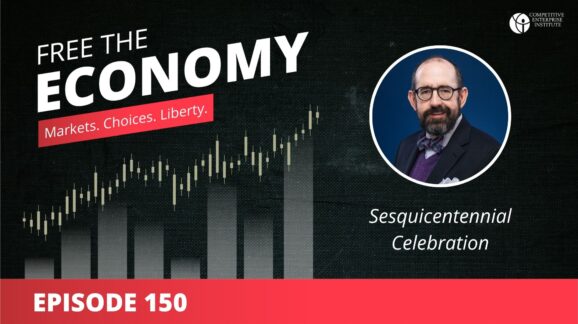There are two main areas in which Congress can enact meaningful reform. The first is to rein in regulatory guidance documents, which we refer to as “regulatory dark matter,” whereby agencies regulate through Federal Register notices, guidance documents, and other means outside standard rulemaking procedure. The second is to enact a series of reforms to increase agency transparency and accountability of all regulation and guidance. These include annual regulatory report cards for rulemaking agencies and regulatory cost estimates from the Office of Management and Budget for more than just a small subset of rules.
In 2019, President Trump signed two executive orders aimed at stopping the practice of agencies using guidance documents to effectively implement policy without going through the legally required notice and comment process.
Featured Posts

Blog
Free the Economy podcast: Sesquicentennial celebration
In this week’s episode we celebrate the show’s sesquicentennial anniversary – that is, our 150th episode. We look back at the dozens of smart,…

Blog
Shutdown lesson: Depend less on DC
The record-length shutdown showed how dependent many Americans are on Washington. This is one of the biggest flaws in the ongoing nationalization of politics. In…

Blog
The week in regulations, the final shutdown edition: Manifest mailing and broken trash incinerators
The federal shutdown is over. Since the Federal Register has a few days’ lag time for publishing agency documents, it will likely take until this…
Search Posts
Op-Eds
Fear Factor
Environmental activists seeking to halt the worldwide spread of the advanced technologies they fear see <?xml:namespace prefix = st1 ns = “urn:schemas-microsoft-com:office:smarttags” />China…
Op-Eds
Obesity: a Sign We’re Doing Things Right
Health and Human Services Secretary Tommy Thompson recently designated obesity a disease, with all the negative implications that entails. Our society, crippled, it seems,…
Op-Eds
Bookshelf: Fighting Disease Is Only Half the Battle
As a fresh-faced medical intern, a colleague of mine once greeted a new patient with a breezy, “So what’s your problem?” “Oh, just a touch…
Op-Eds
California Wine vs. Two-Legged Pests
<?xml:namespace prefix = st1 ns = “urn:schemas-microsoft-com:office:smarttags” />California is under attack by parasites, of both the six-legged and two-legged variety. The former are…
Op-Eds
Tort Law ‘to Make Law’
A recent little-noticed New York Times story says a great deal about <?xml:namespace prefix = st1 ns = “urn:schemas-microsoft-com:office:smarttags” />America's current legal climate:…
Op-Eds
RFID Tags and Privacy
Radio frequency identification (RFID) technology promises many consumer benefits. With RFID, goods on trucks, in trains, and in warehouses can be inventoried without unloading…
Staff & Scholars

Clyde Wayne Crews
Fred L. Smith Fellow in Regulatory Studies
- Business and Government
- Consumer Freedom
- Deregulation

Ryan Young
Senior Economist
- Antitrust
- Business and Government
- Regulatory Reform

Fred L. Smith, Jr.
Founder; Chairman Emeritus
- Automobiles and Roads
- Aviation
- Business and Government

Sam Kazman
Counsel Emeritus
- Antitrust
- Automobiles and Roads
- Banking and Finance

Marlo Lewis, Jr.
Senior Fellow
- Climate
- Energy
- Energy and Environment